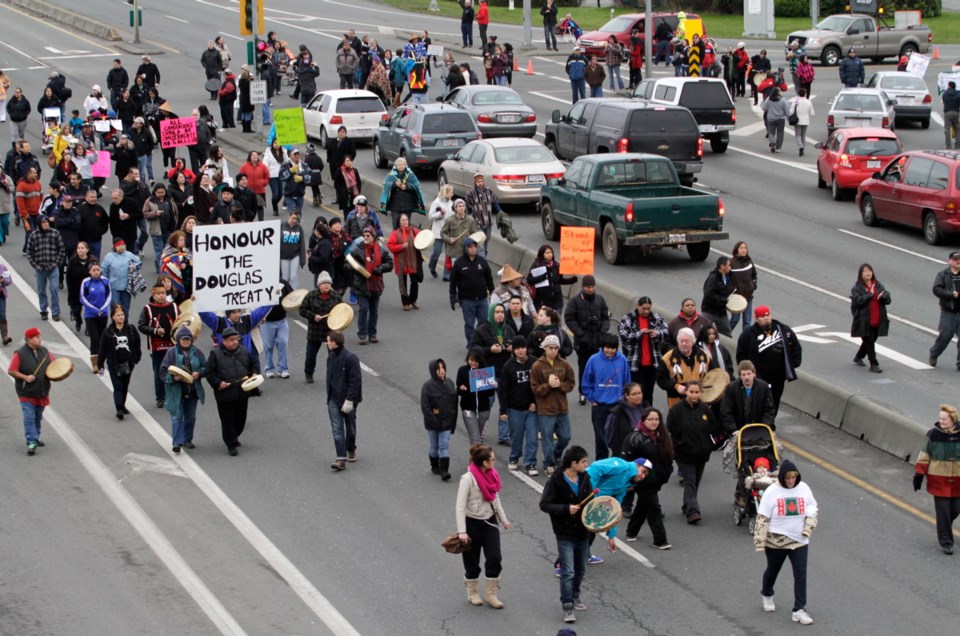The principles behind the Idle No More movement are admirable, but blockades and protests that disrupt local economies are not the route to meaningful change, says Huu-ay-aht First Nation Chief Councillor Jeff Cook.
As one of the first bands in B.C. to complete a treaty, Huu-ay-aht members have a unique perspective on the importance of economic development, Cook said. “We all know the world revolves around that,” he said.
Huu-ay-aht, which has its main reserve at Anacla, outside Bamfield, was one of five bands that signed the Maa-nulth treaty, finalized in April 2011.
The nationwide Idle No More protests were discussed at a council meeting, and members wanted to emphasize that while they appreciate the frustrations that have led to the movement, they do not support some of the tactics, Cook said.
“The federal government has completely rewritten its environmental protection laws. Additionally, the laws around the lease of land on federal Indian reserves were changed,” Cook said in a statement.
“When it comes to treaty rights and laws that affect lands, waters and wildlife, meaningful consultation must occur between Canada and its First Nations.”
But Huu-ay-aht does not support road blockades or disruption of local economies, Cook said.
“[We] feel that these actions hurt the overall perceptions of First Nations. Rhetoric, blockades and personal attacks solidify people in their opposing viewpoints rather than shock them into change.”
The cross-Canada Idle No More movement was sparked by the federal government’s omnibus budget bills, which were seen as gutting environmental protections and trampling on indigenous treaty rights.
Demonstrations and blockades sprung up across the country and, although the aims of those involved differ, many took inspiration from the hunger strike of Attawapiskat Chief Theresa Spence.
In Greater Victoria, demonstrators blocked the Coho ferry terminal last month, which brought mixed reaction from travellers. Later in January, an Idle No More demonstration blocked the Pat Bay Highway for about two hours.
Flash mobs featuring singing and dancing at local shopping centres have been generally well-received by shoppers. A planned flash mob for the Bay Centre was moved elsewhere last weekend after the timing was found to clash with a bridal show.
One of the major themes of the demonstrations has been the need for the federal government to recognize and negotiate treaties.
Cook agrees treaties provide a way forward, but it’s a long, tough road, and there are no shortcuts, he said.
The Maa-nulth treaty, which gives the First Nations self-government and control over land and resources, took 15 years of negotiations.
Treaties do not mean everyone’s lives change overnight, and some band members are disappointed because their expectations have not yet been met, but there are now possibilities for the future, Cook said.
Most Huu-ay-aht members strongly support Assembly of First Nations national Chief Shawn Atleo, Cook said.
“He does a lot of negotiating and talking, which we think is the way to go, but we know others think that protests are better.”
Regional Chief Jody Wilson-Raybould of the B.C. Assembly of First Nations was not available to comment Wednesday on whether other B.C. First Nations are struggling with some Idle No More tactics.
A statement signed by 35 chiefs at a B.C. AFN meeting last month emphasizes support for the ideals of Idle No More, but makes no mention of tactics.
“We, the indigenous leaders of B.C., acknowledge and appreciate that the actions of our citizens are helping to create critical political momentum and will continue to be essential in ensuring fundamental change in the relationship between First Nations and Canada, a requirement for the better future we all desire,” the declaration says.



